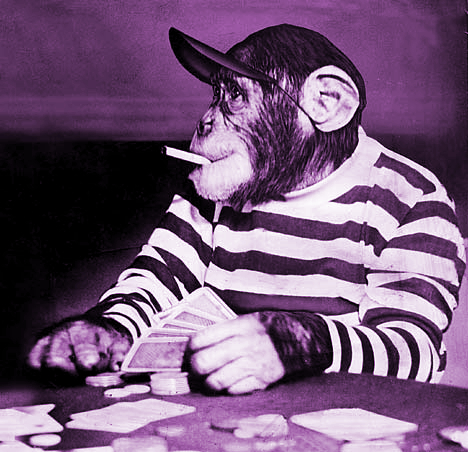Gambling gains only part of the game
 A new study suggests monkeys have a very human desire to learn, especially if it proves them right.
A new study suggests monkeys have a very human desire to learn, especially if it proves them right.
New research has found that monkeys are willing to give up a large portion of a prize in order to quickly learn if they picked the right option to win it.
The project quantified just how eager they are to gain new information, even if there are not immediate benefits.
The findings also offer insights into how a certain part of the brain - shared by monkeys and humans - plays a role in decision making, and could even play in to some disorders and addictions in humans.
In the study published in Neuron, monkeys were presented with a video gambling task in which they consistently chose to learn in advance if they picked the winning option.
The monkeys did not receive their prize any sooner, which was a measure of juice or water; they were simply informed immediately if they selected a winner.
“It's like buying a lottery ticket that you can scratch off and find out if you win immediately, or you can buy one that has a drawing after the evening news,” explained researcher Benjamin Hayden.
“Regardless, you won't get the money any more quickly, or in the case of the monkeys, they won't get the squirt of water any sooner. They will just find out if they selected the winning option.”
Hayden is co-senior author of the study and professor in brain and cognitive sciences at the University of Rochester.
“When it's simply a choice between getting the information earlier or not, the monkeys show a pretty strong preference for getting it earlier. But what we really wanted to do is quantify this preference,” said first author and lead researcher Tommy Blanchard, a Ph.D. candidate in Hayden's lab.
In the experiments, monkeys were presented with graduated coloured columns illustrating the amount of water that could be won.
The monkeys were observed to be more curious about the gambles when the stakes - or columns - were higher.
The researchers found the monkeys not only consistently selected the gamble that informed them if they picked a winner right away, but they were also willing to select that option when the winnings were up to 25 percent less than the gamble that required them to wait for the results.
“One way to think about this is that this is the amount of water the monkeys were willing to pay for the information about if they made the correct choice,” explained Blanchard.
“These monkeys really, really want that information, and they do these gambling tasks repeatedly and never get bored of them - it's intrinsically motivated,” Hayden said.
Just like monkeys, humans always evaluate what they would be willing to pay - or give up - to satisfy curiosity.
In the case of gambling, there is also the potential of a prize to factor in.
The researchers say that when a person makes a choice, it depends on the sum of those two things: the gamble (the money they might win), and the value of finding out.
Those two things need to be combined in order to make decisions about the gamble.
Interestingly, previous research has shown that these components are combined in the brain's dopamine system.
This study looks at that one step earlier in the process, in a region of the brain called the Orbitofrontal cortex, or OFC.
“I think of the OFC as the workshop of economic value, where, in this case, you have the value of the gamble and the value of the information - the raw materials - but they haven't yet been combined,” said Hayden.
“This study seems to have revealed that the mixing of the raw materials happens somewhere between the OFC and the dopamine system. We now have two points in the circuit.
“One of the reasons this research is important is because this basic desire for information turns out to be something that's really corrupted in people with anxiety, depression, obsessive-compulsive disorder, and addiction, for example.”








 Print
Print